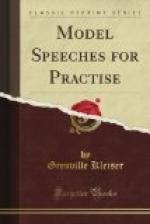On the day we celebrate, the sun for the first time in his course looked down upon a different scene, begun and continued under a different inspiration. A few conscientious Englishmen, in obedience to the monitor within, and that they might be free to worship God according to their own sense of duty, set sail for the unknown wilds of the North American continent. After a voyage of sixty-four days in the ship Mayflower, with Liberty at the prow and Conscience at the helm, they sighted the white sandbanks of Cape Cod, and soon thereafter in the small cabin framed that brief compact, forever memorable, which is the first written constitution of government in human history, and the very corner-stone of the American Republic; and then these Pilgrims landed.
This compact was not only foremost in time, it was also august in character, and worthy of perpetual example. Never before had the object of the “civil body public” been announced as “to enact, constitute, and frame such just and equal laws, ordinances, acts, constitutions, and offices from time to time as shall be thought most meet and convenient for the general good of the colony.” How lofty! how true! Undoubtedly, these were the grandest words of government with the largest promise of any at that time uttered.
If more were needed to illustrate the new epoch, it would be found in the parting words of the venerable pastor, John Robinson, addrest to the Pilgrims, as they were about to sail from Delfshaven—words often quoted, yet never enough. How sweetly and beautifully he says: “And if God should reveal anything to you by any other instrument of his, be as ready to receive it as ever you were to receive any truth by my ministry; but I am confident that the Lord hath more light and truth yet to break forth out of his holy word.” And then how justly the good preacher rebukes those who close their souls to truth! “The Lutherans, for example, can not be drawn to go beyond what Luther saw, and whatever part of God’s will he hath further imparted to Calvin, they will rather die than embrace, and so the Calvinists stick where he left them. This is a misery much to be lamented, for tho they were precious, shining lights in their times, God hath not revealed his whole will to them.” Beyond the merited rebuke, here is a plain recognition of the law of human progress little discerned at the time, which teaches the sure advance of the human family, and opens the vista of the ever-broadening, never-ending future on earth.
Our Pilgrims were few and poor. The whole outfit of this historic voyage, including L1,700 of trading stock, was only L2,400, and how little was required for their succor appears in the experience of the soldier Captain Miles Standish, who, being sent to England for assistance—not military, but financial—(God save the mark!) succeeded in borrowing—how much do you suppose?—L150 sterling. Something in the way of help; and the historian adds, “tho at fifty per cent. interest.” So much for a valiant soldier on a financial expedition. A later agent, Allerton, was able to borrow for the colony L200 at a reduced interest of thirty per cent. Plainly, the money-sharks of our day may trace an undoubted pedigree to these London merchants. But I know not if any son of New England, opprest by exorbitant interest, will be consoled by the thought that the Pilgrims paid the same.




